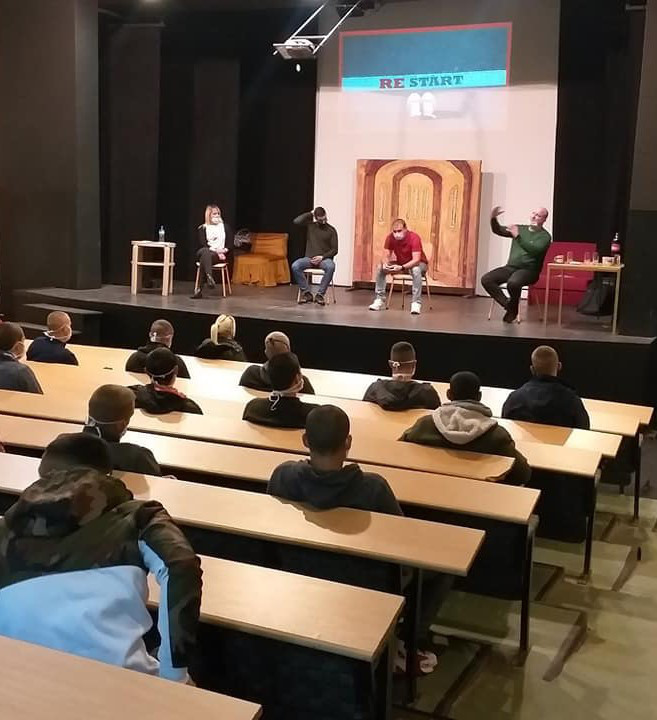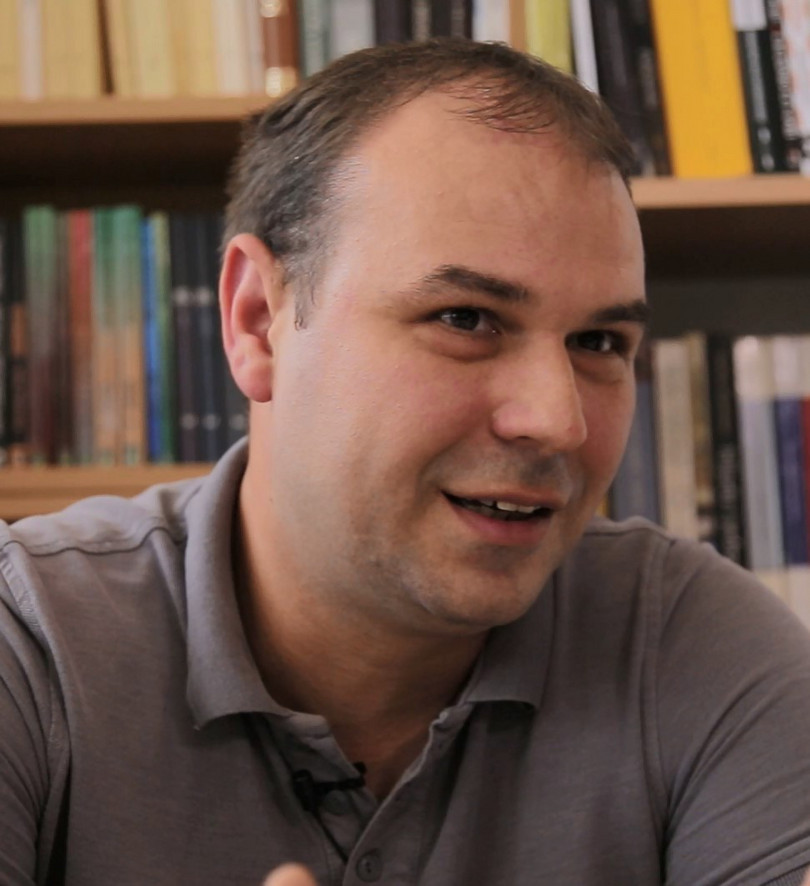Neostart, a place for a second chance.
There are currently about 12 000 prisoners in Serbia; around 8 000 of them are released from prison each year. However, with a recidivism rate of 60 to 75 per cent, many of them will end up back in prison. Neostart, a centre for crime prevention and post-penal assistance, is a non- governmental organization in Serbia that is helping reduce vulnerability to recidivism by supporting former offenders in their efforts to reintegrate into society. We talk to its director, Darjan Vulevic, about their work and challenges and successes.
Who are the people involved in Neostart and what motivates you?
A variety of individuals are engaged in Neostart: teachers, psychologists, lawyers, college students and social scientists, as well as former prisoners. For some members of Neostart, this line of work is a professional calling. Others are involved because they have survived a similar fate, either living on the street or having served time in prison. And some take part because they want to help those who are not often given a second chance.
What is life like for someone just released from prison?
It is tough. The lack of personal documents is a significant problem: they usually expire while the person is in prison. In 2016, half of all people released from prison in Serbia did not have valid personal documents. The situation has improved somewhat since then, but registration is still often tricky. This creates a snowball effect where, without documents, it is hard for people getting out of prison to apply for jobs or even receive some public services, like healthcare.
How difficult is it for former prisoners to find work?
A person released from prison after a lengthy sentence does not have the same opportunities to find a job as other people. One reason is that many employers require a certificate that says you don’t have a criminal record. Another reason is psychological: it is hard to adjust after being in confinement for 22 hours a day. The transition to freedom can be difficult. Offenders need preparation for life outside while still serving time in prison, as well as support after they re-enter society.
Can you share any success stories?
One of our most satisfying successes was when we helped a former offender open a pizzeria. The pizzeria has since become a success and the owner now assists other former prisoners reintegrate into society. None of our achievements would have been possible without the dedicated work of our volunteers, of whom I am particularly proud.
Do men and women face different challenges after release from prison?
Of the 12 000 people in prison in Serbia, only 200 are women. While many prisoners share similar experiences, every person is unique and we have seen that men and women face different challenges, especially in terms of finding employment. In general, women say that they have no problem finding a job and thus approach us for employment assistance much less often than men. Many of them are mothers who return to their families. In some cases, this provides a support network, but in other cases it presents additional challenges. Therefore, women make more use of our counselling and family programmes.
Often prisons are ‘finishing schools’ that turn petty criminals into hardened ones. Have you encountered this problem? Do you provide any counselling or conduct other activities with prisoners before or after their release to reduce their risk of moving up the crime ladder?
Sadly, this is a real problem, as you can see from the 70% recidivism rate. The former prisoner’s first days
after leaving juvenile detention or a correctional facility are the most crucial. If the person does not get comprehensive support in this early period, the chance of recidivism grows. That is why we launched a post-penal programme targeting youth upon their release from prison.
What support does Neostart provide to former prisoners?
We have five programmes and a helpline. These programmes include support for jobseekers, such as training to write a CV and prepare for a job interview. I am proud to say that those clients who came to us at least three times all managed to get a job. Often, previous clients return when they want to change careers or find a better job. Through fieldwork, we provide direct support to former prisoners who are in contact with state institutions and other services. One of our most in-demand programmes is counselling for former prisoners trying to overcome existential problems, especially immediately after their release. Psychologists help ex-prisoners deal with specific concerns. We also have a family programme, which usually begins while the person is still incarcerated. The goal is to create a healthy atmosphere in the family after the prisoner’s release. We also provide support to young people, such as those leaving the correctional facility in Kruševac or the juvenile prison in Valjevo. Most recently, we have managed to provide food and accommodation for vulnerable youth to prevent recidivism.
You recently visited the youth correctional facility in Kruševac. What was your impression?
We created a special programme for young people that we are implementing together with organizations in other Serbian cities, such as Restart in Novi Sad or the Youth Council in Kruševac. We presented the programme in the correctional facility and tried to motivate young people to get involved. The discussion about what they can expect in the first few days after their release was very intense because of their anticipation and excitement about their plans and needs.
How do former prisoners find Neostart?
Neostart staff regularly visit prisons, which enables us to talk to prisoners weeks or months before their release. In this way, we get to know each other and can identify problems in advance. Neostart has been engaged in
this work for ten years; we are now quite well-known, so it easy for ex-prisoners to find us. We also often receive letters from current or former prisoners or are contacted by a prisoner’s family member. Some ex-prisoners call us after their release to arrange a meeting.
What do your clients usually ask you for first?
They usually ask if we can give them money, work or provide some material support. Unfortunately, we are not able to offer a job except on rare occasions. Approaching an organization like Neostart is not for everyone, but for those ex-prisoners who contact us, there is usually a great atmosphere, since people who want to invest in themselves get actively involved in our activities.
What challenges do you face?
Donors do not want to provide direct support for ex-prisoners. This forces us to focus on projects that can help the post-penal system as a whole. Of course, this is worthwhile, but the results often do not have an immediate impact on the lives of those who need help the most.

In November 2020, Neostart and its partners visited a youth correctional institution and held a talk-show style discussion with about 20 inmates on how to start over after their release.
How has COVID-19 affected your work?
It has made the situation worse, since prisons have become even more closed. The prisoner’s contact with family and friends is problematic, which makes it more difficult to plan and carry out post-penal support programmes. We are not able to visit prisons at the moment, which is an obstacle to helping prisoners to prepare for the challenges they will face upon release. During the first lockdown in April, we had cases where people who had just been released from prison had to walk 80 kilometres from Požarevac to Belgrade because public transport was not working.
What measures could improve the post-penal support system in Serbia?
Preparation for release should begin on the day the person starts serving his or her sentence. This would require a larger number of post-penal treatment officers, but could reduce the high rate of recidivism. Alternatives to imprisonment should also be considered. To that end, it is necessary to improve cooperation between the alternative-sanction authorities and other sectors in society such as the non-governmental organizations that provide direct services. More significant financial aid from the state, as well as overall support is needed to ensure a better functioning post-penal system and to reduce vulnerability to recidivism.
Neostart is a recent beneficiary of support from the Resilience Fund. What does this project mean to you?
In the past, young clients often disappeared halfway through the support programme. They stopped engaging or responding. They did not want to admit that they had gone back to doing something that they felt was essential to survival, although they knew it was not in their interest in the long run. The Resilience Fund project gives us the means to reduce the burden on young people who have just been released from a correctional facility. The support provided by the Resilience Fund enables us to help these young people deal with existential problems on their first day of freedom, such as finding the money for food and accommodation. This allows them to concentrate on the future and build a new life.

Darjan Vulevic is one of the founders of Neostart and the organization’s new director. He graduated from the Serbian police academy and specializes in working with former prisoners, young offenders and drug users. He is the co-author of a number of publications on post-penal practice.
